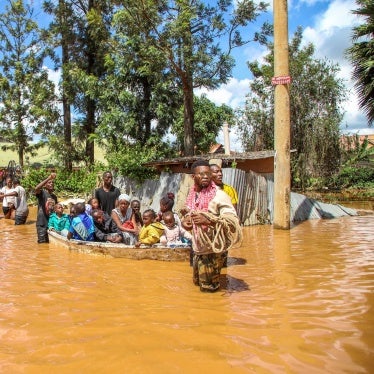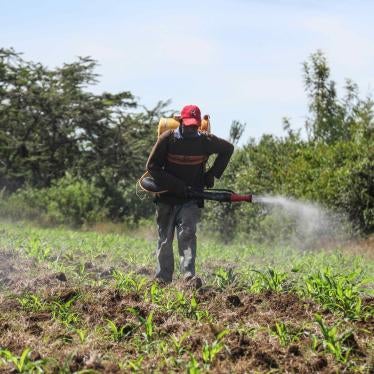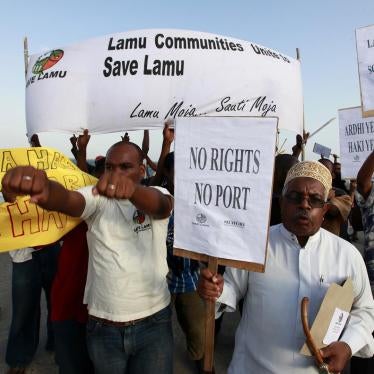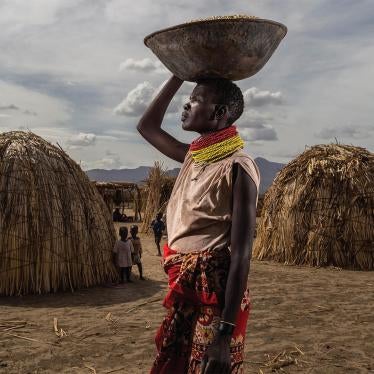This remote region in Kenya’s north-west is known as the cradle of humankind. But it is a case study in how climate change forces people off their land.
It was in Kenya’s Turkana County, near the border with Ethiopia, where one of the earliest human skeletons, dating back more than one million years, was found. But climate change is threatening the residents, and it illustrates how the global response to climate change should emphasize human rights.
Turkana is a desperately poor region, among the poorest in Kenya, hammered by conflict and crippled by drought. It is home to the world’s largest desert lake, and the Turkana people, an indigenous community that has long persevered in an inhospitable landscape, herding animals and fishing. Cyclical droughts and high birth rates are longstanding challenges to the region’s development. Added to that are two more recent threats: large-scale development projects across the border in Ethiopia that threaten to siphon off much of the water feeding Lake Turkana, and climate change, which is exacerbating competition for scarce grazing lands and water.
Turkana is an important case to examine as governments around the world finalize a new agreement on climate change. Two months before governments are planning to convene in Paris to adopt the treaty, there is little consensus. How the future agreement will ensure the reduction of greenhouse gas emissions that are the cause of climate change is still uncertain. There is no agreement yet either on how basic human rights, including the rights to water, food, and health, will be protected, and help for those most vulnerable people be provided.
"During the dry season I go [get water], not just once a day, but in the morning, then later in the evening, tomorrow again same thing,” Everlyne, an indigenous woman told us. "When I go early in the morning I come back at noon."
Everlyne knows what it means to live in an area that has long been prone to droughts. She is used to the extreme dry seasons, when she has to walk long distances every day to fetch water from the small streams or dig for water in dry riverbeds. Yet Everlyne also said: “Some time back, when the rain was enough, the water could last for even four months. But now things have changed, as the wells dry very fast.”
Climate scientists agree. The Horn of Africa is among the world’s regions hit hardest by climate change. Data collected by the Kenyan government shows that temperatures in Turkana have increased by between 2 and 3 degrees celsius over the past 45 years, a rate far greater than in other regions of the world. Rainfall patterns seem to have changed as well, with the long rainy season becoming shorter and drier. These changes have pushed the Turkana people into an even more precarious situation: water is harder to access, there is more competition over diminishing grazing lands, and animals are less healthy. Herds are dying.
While climate change will impact all of us, the fate of the Turkana people in Kenya illustrates the impact climate change is already having on the most marginalized people, especially in countries with limited resources and fragile ecosystems. Climate change is not simply about icebergs melting and polar bears losing their habitat. It will mean the loss of lives, homes, and livelihoods.
Governments have recognized their responsibility for the human causes of climate change and have pledged to cut carbon emissions. This includes higher-income countries, which have contributed the greatest amount of greenhouse gases into the environment and have promised to support lower-income nations’ need to adapt to the impact of climate change. But unless governments around the world start turning their words into action, this won’t help the most vulnerable populations such as indigenous peoples, women, children, and people with disabilities, who are already suffering from the impact.
The situation for the Turkana people in Kenya looks pretty dire.
At a local level, the Turkana County and Kenyan governments have acknowledged the impact of climate change. But the development and implementation of national policies addressing the effects of climate change have been delayed several times.
At a global level, the delegates for the upcoming Paris conference have spent endless hours over the past year trying to find a middle ground between those who ask for drastic emission cuts and financial and technical assistance for countries and people who already need help, and those who resist ambitious and mandatory climate action. The result is disappointing: the most recent draft agreement published by the chairs of the climate change conference does not contain a single provision recognizing the importance of meeting the human rights of people whose access to food, water, and health are already deeply affected.
Including attention to these basic rights in the response to climate change can help encourage accountability and attention to people who are disproportionately affected. It can also reinforce the importance of including these populations in finding viable strategies to adapt to the effects of climate change. Governments have a chance to get this right. The stakes are high, both for the people of Turkana, and for all the descendants of this region—that is, for all of humankind.









